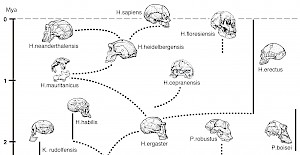Birth Feb 23, 2004 Being naked, hot, and dirty was normal for the small tribe that lived on the edge of the foothills on the East African plain. The daily struggle and violence of life a million and a half years ago made novelties like bathing entirely unnecessary. Thus, the actions of two of the women in the tribe seemed to the others to be an incomprehensible waste of time. Even the leader of the group, possessed as he was with superior strength and intelligence, gazed in bewilderment whenever the women walked into a river and bathed. The two women refused to explain why they bathed so frequently. When asked, they simply shrugged. They had both dreamed a mysterious dream—a secret dream. A man as tall as the clouds had pointed at their bellies and smiled. He had lifted them into the sky and carried them on his hand to the river’s edge, where he had gently nudged them into the water and shown them how to bathe. After waking from their dream, they had made their first tentative forays into the river, not knowing what to expect. They had been surprised by the pleasure they felt as the cool water washed away their sweat and grime. They liked the experience of being clean. They had known each other all their lives, but it wasn’t until they found themselves in the river, day after day, that they realized they were friends. When they compared the growing size of their bellies, they glanced at their mates, hunkered over a freshly killed animal with the other men, and then looked at each other and laughed as they sank back into the river and floated luxuriously on their backs. The other women had borne many children, but had never resorted to games like floating in rivers. Most of them had gone about their duties and delivered their children without much thought. Biting off their children’s umbilical cords were minor incidents that caused hardly a flicker of interest from their hunter mates. The two women, and their habit of bathing in the river, gradually caused more and more consternation within the group. Their skin had become shiny and clean—a truly unusual state for members of the Ergaster tribe. As the weeks and months passed, and their bellies grew, the women grew stubborn and refused to work in the hottest part of the day. The elder of the two women had an especially difficult time with her mate, and argued loudly when he pushed her to sharpen his stone blade. Instinctively, she knew that she had to rest and preserve the child growing inside her. The younger woman had a much easier experience, perhaps because her mate was intensely curious about her condition. He continually passed his fingers across her swollen belly, marveling at the shape as it expanded. Neither of the women had ever borne a child before, and they were increasingly nervous as the day of delivery drew near. They had shown their bellies to some of the older women, who had patted them and grunted approvingly. Their elders’ lack of concern had comforted the two younger women to some degree. When the leader of the group urged everyone to move to some nearby foothills, the two women successfully pleaded with him to stay near the river as they traveled. It was a small victory, easily won, because the leader by this time had begun to view the women as special to the tribe. The leader even managed to convince the older women that the “Clean Women,” as they had become known, were good luck, and had been the cause of the tribe’s successful hunting. The foothills were a pleasant change after the acrid heat of the plains. The tribe had carried a quantity of meat with them and feasted on it hungrily, laughing and shouting to each other about their exploits, and plans for the next hunt. The men hardly noticed when the Clean Women went into labor one evening. The older women shooed the men away, and kept the two women company as they prepared for birth. The wise women found it fascinating that both women were in labor at the same time. No one could explain why it had happened, but the discussion kept them occupied while they waited through the night. The mothers’ contractions lasted for many hours, until, exhausted and bleeding, the two women finally gave birth. Morning brought with it a long series of amazed exclamations as the men gathered in a circle around the two mothers and their new babies. The elder mother had given birth to a male, while the younger mother was curled up next to her admiring mate, clutching to her breast a tiny baby girl. The leader of the group pushed his way past the other men and pointed at the faces of the boy and girl, scowling at their delicate features. They seemed much too fragile to the leader, with bones that were too small and faces that were too thin. He immediately announced that they wouldn’t survive. The older women glared at him, but many of them secretly agreed with the leader. The Homo Ergaster lifestyle was not a suitable one for weak children. The Clean Women spent the next two years nursing and bathing the boy and girl, drawing unbelieving snorts from the men when they washed the children in the river. The women’s breasts, at first heavy with milk, grew smaller as they gradually weaned the boy and girl, feeding them with bits of food that the mothers had carefully chewed in advance. In what seemed to the older women to be amazing good fortune, the babies didn’t die that first year, or the second. Instead, they grew healthier and noisier each day. By the end of the second year, the boy and girl had won the grudging approval of everyone in the tribe, including the leader, who had taken to rolling on his back and lifting them in the air above his chest. The two women walked proudly among the other women, showing off their children, aware that they were indeed special and unusual. They had a hard time harnessing the boy, and often had to chase him around the camp, followed by a group of screaming and laughing children. The boy spent most of his time trying to climb the gnarly trees that surrounded their camp. Since he was still so small, he was unsuccessful, but he never stopped trying. His father watched gleefully, laughing when the boy kicked the trees in frustration. Ergaster children were not encouraged to be timid, since weakness and fear often brought an early death. The boy’s boldness was so pronounced that the older men started to murmur that the boy would one day become the leader. It was the girl, however, who won the hearts of the men and women of the tribe. Even though she displayed the same predilection for bathing as her mother, her sweetness and the warmth of her smile turned even the toughest, broken-boned old hunters into small children again. If the hunters came back to the camp with bruises or wounds, she would run and examine them with her tiny hands. She filled broken bird eggs with water from the river and poured it over the hunters’ cuts. Her tenderness brought the hunters huge amusement, since they normally ignored their wounds after they had stopped bleeding. Yet, the girl insisted on wrapping their cuts with bits of grass, and even tried crushing flowers into their wounds, causing the men to laugh so hard that one hunter almost choked to death on a bone. One particular afternoon, just as the sun had started its slow glide toward the foothills, the mothers were talking quietly, watching the boy and girl tumble around their feet. They heard a clamor from some of the men and looked up to see something that none of the Ergaster had ever seen before. An unusually tall man stood in front of the two mothers, gazing at the boy and girl. None of the members of the tribe had seen him approach, which was very troubling to them, since they always kept a close watch for lurking animals around the camp. The leader ran up to the man, talking quickly, pointing around the clearing, asking the man where he had come from. The man smiled and nodded, and pointed to the foothills. The leader asked him who he was, and what tribe he came from. He replied with strange words that the leader didn’t understand. Suddenly the man bent down and gently laid his hands on the heads of the two mothers. They were trembling, and had scooped their children to their breasts, but they began to feel calmer as he smiled at them. When he pointed at their bellies and laughed, they drew back again in fear. They had forgotten their dream of the man as tall as the clouds. He now stood before them, smiling, whispering to them softly, as they usually did when their children came to them in tears. He sat down in front of them, and massaged their hands gently. He didn’t look at all like the Ergaster, and the women silently noted to themselves that, unlike the other men in the tribe, he was extraordinarily clean. The man held out his hands for the boy and girl, and, without knowing why, the two women carefully handed the children to him. He cradled them in his arms, enveloping them within his large frame. The toddlers seemed particularly interested in his long, shiny hair. He teased the boy and girl, brushing his hair against their faces until they giggled. As he played with the children, he started to sing, softly at first, and then very powerfully. The Ergaster loved to sing, and had a song for almost every occasion, but the stranger’s complex melodies were startling, and immensely attractive to them. Soon the entire tribe was seated around the two women, weaving back and forth as the tall man sang with words and tones that they had never heard. The oldest woman of the tribe, who knew many things, began to weep. She sat next to the stranger and placed her cheek against his shoulder. He smiled at her and continued to sing. He sang for a long time, caressing the tribe and the women with his voice, leading them through feelings that were unexplainable. The two women leaned against each other, with their arms linked and their eyes unseeing. The stranger’s voice had led them back to their dream two years before, back to the end of their dream that they had not understood. Now, as he sang, they saw their dream again. They saw the stranger grow taller, so large that he once again picked them up and carried them in the palm of his hand. They heard his voice in their minds while they dreamed, if it was a dream, for they also heard him singing, sitting in front of them with their children on his lap. They watched from the palm of his hand as he strode to the top of a mountain, and then turned his body so that they could see the plains below. If they had not been dreaming, they would have fallen from his hand in fear because of the vastness of the world. As it was, they trembled and shrank back against his hand until his singing soothed them. His song brought images and thoughts to their minds, images of an enormous and bewildering world, and thoughts of the One who made everything. They felt confused in their dream, but the images kept coming, images of a special light shimmering inside their children, and images of their children growing and becoming the leaders of a new tribe who lived with the One who made everything and understood his thoughts. The images were overwhelming to the two women, and they felt relieved as the man stretched out his arm toward their camp. As his hand hovered over the tribe, they were surprised to see themselves, surrounded by a crowd of children, laughing and splashing in the river. As their vision ended, they saw the tall man sitting silently in front of them, gazing at them with a curious warmth that the women had never seen before. They smiled at him, and he smiled in return. The man slowly stood up, with the children in his arms, and looked around at the tribe, and then at the two women. He spoke, but no one could tell if they heard his words, or just felt them in their minds. He smiled again and said, “You have done very well. You will have many, many children.” The mothers sprang to their feet instinctively, arms outstretched toward their children, with sudden and uncontrollable tears streaming from their eyes. The girl and boy started to cry as the mothers kissed their cheeks passionately, holding their hands and caressing their faces. Finally, the man bent over and carefully and slowly kissed each woman’s forehead. His kisses quieted the two women in spite of themselves, and they watched in resignation as the tall man turned and walked rapidly toward the foothills, bearing the children in his arms. The men of the camp, including the two fathers, started to run after the stranger, but the old wise woman sharply called them back. They reluctantly returned, confused but obedient to the woman’s authority. The leader and the group talked for hours after that, trying to console the two mothers. The entire tribe was in shock. No one could quite agree on why the tall man had come for the children. The wise woman insisted that the Clean Women had done something special. The leader agreed with her and tried to comfort the tribe by making an impromptu speech and declaring that the Clean Women would bring good hunting. He wasn’t sure what it all meant, but he encouraged the two women to go into the river and bathe, assuming that the water might help them. The two mothers sat by the river’s edge, blinded by their grief, unable to speak. They rejected their food that evening until the wise woman shook them and forced them to eat. It wasn’t until they fell asleep that they found solace. The tall man appeared to them again, smiling and caressing their cheeks and hugging them tightly. They had the same dream for the next two nights, and by the morning of the fourth day, they were able to talk to each other about their children. They told the wise woman about their dreams, and were grateful when she nodded sympathetically. They decided to follow the leader’s advice, and immersed their bodies in the cool water of the river. They lay back, floating for a long time, looking at the sky. The leader watched them for a while, and then grunted sadly and went back to the other men. All the women of the tribe came and sat at the river’s edge in silence, hoping that their presence would help the two mothers in some small way. The old wise-woman looked at the two young women as they floated in the water and reminded them that the tall man had said they would have many children. They responded halfheartedly, but as they looked at each other, they knew that the old woman was right. Far beyond the other side of the foothills, the tall man finally slowed his stride as he approached the edge of a lush valley. He had stopped frequently to care for the children, but had still managed to travel very quickly over a great distance. He looked down at the boy and girl, now asleep in his arms, and with a smile began to slowly walk down to the bottom of the valley. The man sang as he walked—a beautiful melody that filled the air around him. As he approached a meadow at the floor of the valley, other voices joined his as he sang, until the sound of the voices moved in waves across the meadow. Other figures walked next to him, gazing admiringly at the boy and girl, exclaiming at the beauty of their faces. Finally he stopped and gently placed the sleeping children on the grass at the foot of a large tree. He straightened and waved at the angels around him. The atmosphere in the valley had become charged and intense, sparkling in the sunlight and radiating with millions of colors. The children stirred, and he looked down at the girl as she woke up. The man smiled at her, and ever so gently touched her nose with the end of his finger. • • • • Author’s Note: This story is, of course, conjecture. Did the human race begin with the birth of two children, known in the English Bible as Adam and Eve? Were they born from early hominin parents, under God’s supervision, and with God’s spiritual and creative input? Will we ever know what really happened? I hope so. . . .
* Chart excerpted from "Extinct Humans", by Ian Tattersall and Jeffrey H. Schwartz (Westview Press). Used with permission.
(Comments are moderated and must be approved.) “The Epiphany of Zebediah Clump”
Watch our first film right here. |





 Peter Falkenberg Brown is passionate about writing, publishing, public speaking and film. He hopes that someday he can live up to one of his favorite mottos: “Expressing God’s kind and compassionate love in all directions, every second of every day, creates an infinitely expanding sphere of heart.”
Peter Falkenberg Brown is passionate about writing, publishing, public speaking and film. He hopes that someday he can live up to one of his favorite mottos: “Expressing God’s kind and compassionate love in all directions, every second of every day, creates an infinitely expanding sphere of heart.”





